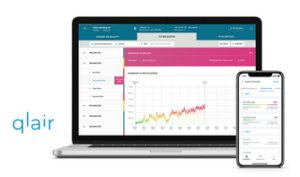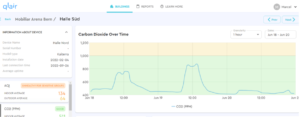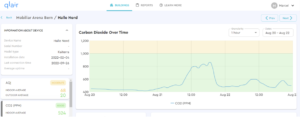In the past few months, we have been working intensively on a project to reduce operating and energy costs, in which we were able to achieve significant optimisations. Below you will find our case study on this project.
Overview of the Case Study

The Mobiliar Arena is a sports hall in Gümligen (Bern), Switzerland, and was completed in August 2018. The arena has a tribune for sporting and public events with a total of approx. 2,400 seats and standing room, a large entrance area with food & drink zone, a separate hospitality room including kitchen for approx. 250 guests and other separate areas such as locker and fitness room. The arena was built according to the MINERGIE standard and therefore complies with the highest Swiss standards in terms of comfort, efficiency and value retention.
The management of the Mobiliar Arena first wanted to get an understanding of how good the air quality is in the arena and to which extent optimisations are possible in terms of operation.
With the help of Frischluftmanager and qlair, the operational complexity around the ventilation system is simplified and filter loading levels and air quality are made visible. In cooperation with qlair, Frischluftmanager achieves the combination of system maintenance, filter loading and storage, filter replacement as well as resource-saving optimisation of the ventilation system and air quality.
Challenge
The challenge in the Mobiliar Arena was that the operators wanted to provide optimal conditions for children’s and youth sports as well as for top-level sports (handball, futsal, volleyball, floorball, fencing) with an audience – for which excellent air quality is a must. At the same time, the operating costs were to be reduced, which was to be achieved by optimising the energy costs and the filter service life without negatively influencing the air quality and ideally even improving it.

Due to the irregular occupancy of the arena on event and non-event days, as well as the conseque
nces of the Corona pandemic in the last two years, the planned arena occupancy has changed, so that the original ventilation plan no longer met the current requirements.
During the first stage of the project, various sensors were installed in the arena and on the facilities in order to measure the air quality and adjust the ventilation plan according to demand. The data was collected via the Frischluftmanager and analysed by qlair.
Results
According to initial findings, the first step was to reduce the ventilation time per day by a total of 4 hours per day in order to reduce the energy costs of the ventilation system and at the same time maintain or even improve the indoor air quality.

Old ventilation plan: Children’s Handball Festival on
19 June 2022 300 visitors; consumption: 329 KWh

New ventilation plan: Supercup on
21 August 2022 350 visitors; consumption: 250 KWh
qlair analysed the outdoor and indoor air quality as part of the adjustments and derived individual ventilation strategies for the arena based on this – with access to real-time data.
In further steps, the ventilation system is to be dynamically adjusted in the future depending on the event and non-event day, so that the system is only used when a pollution load arises from the use of the arena.This should reduce the energy costs of the ventilation system by up to 40% in the long term.
Cost Reduction
The results of the first steps can be seen after only a few months. The operating costs have already been reduced by > 20%, which currently amounts to an energy saving for ventilation of over 1,500 kWh per month compared to the previous year.
At the same time, a better indoor air quality could be generated and even the TCO (Total Cost of Ownership) of the filters used could be optimised, as a new automated maintenance plan is established and the use of an energy- and air quality-optimised filter class is implemented. Through the future automatic filter ordering and the interaction of the different parties in the fresh air manager, the complexity for the hall operator could be significantly reduced.
Ventilation systems represent approx. 50% of the total energy demand for buildings – with optimal use, energy costs can be significantly saved.
Would you like to learn more? Then get in touch today with our IAQ experts at https://i-qlair.com/contact/

